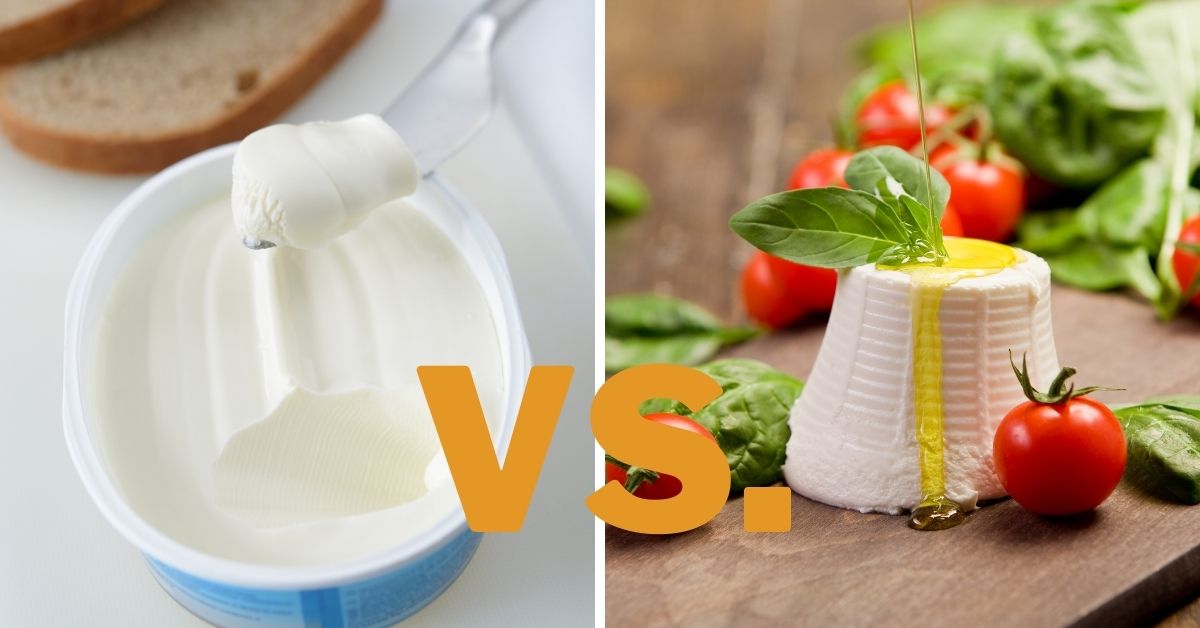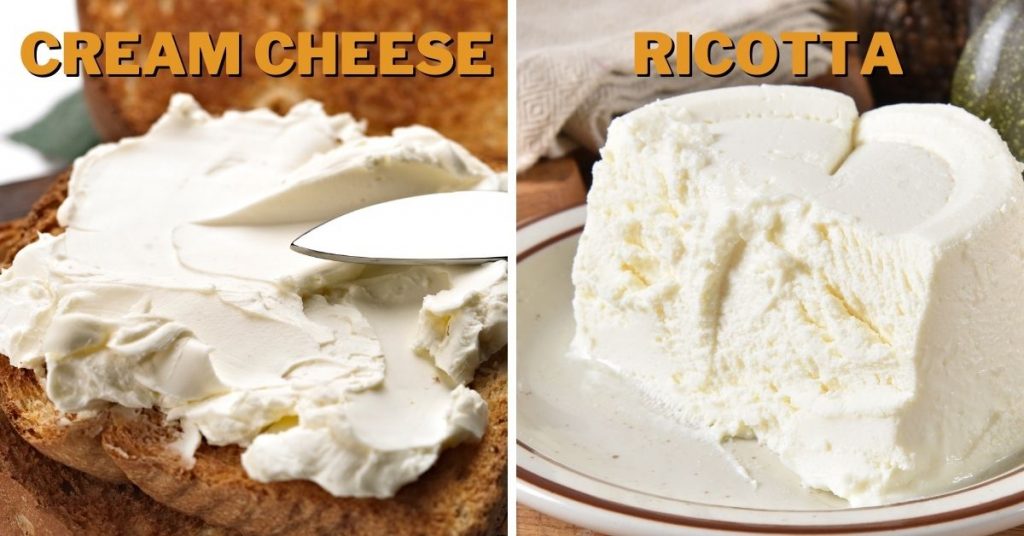Cream Cheese vs. Ricotta: Differences & Which Is Better?


Both superb types of cheese, holding their places in many kitchens, ricotta and cream cheese are the most common soft cheeses on the market. They are used for many purposes and in a large variety of dishes, but you can’t always substitute one for the other, as they have significant differences. So, what are the differences between cream cheese and ricotta, and which is better?
The most significant difference between cream cheese and ricotta is the fat content. Made of pasteurized milk and heavy cream, cream cheese is fattier than ricotta. On the other hand, Ricotta can be made from various types of milk through coagulation and is significantly less heavy.
As a fan of cream cheese and ricotta, I have stumbled upon valuable information about these two beauties. I will discuss their production, texture, taste, nutritional value, and ways to combine them in the following paragraphs. I will also explain their uses to experience them at their best.
Is Ricotta Cream Cheese?
Ricotta is not cream cheese, nor it is the same as cream cheese. While cream cheese is a creamy spread made of milk and heavy cream, ricotta is made of only milk. If your question is if ricotta is creamy, then you should know that it is more grainy than creamy which is the result of low-fat content.
Cream Cheese vs. Ricotta: Differences
Both ricotta and cream cheese are soft and white cheeses, best when served fresh. However, they are two distinct types of cheese, with significant differences between them.
Production Process
While cream cheese is made of pasteurized dairy milk and heavy cream, ricotta is produced of the leftover milk already used to produce other cheeses. Therefore, ricotta can be made of cow’s, sheep’s, goat’s, or buffalo’s milk. Because of the different types of milk, the fat content of ricotta can vary, but in any case, it is much lower compared to cream cheese.
Ricotta is made by heating the milk, whereby casein is added to trigger coagulation. The name “ricotta” means “recooked” because the milk is used twice- once for ricotta and once for another type of cheese.
During the heating process, the milk starts to thicken, forming curds. These curds are later strained to remove the excess liquid. When the straining process is over, the final result is ricotta.
As a rule, ricotta is highly perishable, but there are aged ricotta varieties. Still, the aging process isn’t long, up to two months, and the aged ricotta lasts much longer.
Cream cheese is made of pasteurized dairy milk and heavy cream, which means that it’s highly rich in fats. The production process is relatively simple and easy, and with some skill and knowledge, you can make it at home.
The production process starts by adding lactic bacteria to the milk and heavy cream mixture, separating the heavy cream from the whey. Then, the heavy cream and whey are heated, making them merge, giving the final product a thick and stable texture.
Cream cheese doesn’t need any aging, and you can consume it immediately after making it.
Texture
Because these two come from two different production processes, their textures are also quite different.
Being made of the crudes formed when the milk coagulates, ricotta has a grainy texture. Still, it is somewhat creamy. Because ricotta isn’t pressed but strained to remove excess liquid, it is very moist and soft. Also, there isn’t any cream to hold the curds together, making the liquid the only binder in ricotta.
Cream cheese is also a soft and creamy cheese with a more stable consistency than ricotta. The high amount of fats in the heavy cream gives cream cheese a dense structure and a smooth texture.
Both ricotta and cream cheese are soft and white cheeses; only cream cheese has an overall even, creamy texture, and ricotta is grainy, moist, and less creamy.

Taste
Ricotta and cream cheese are neutral yet rich-tasting types of cheese. However, the different production processes impact their flavors and create some significant differences in this aspect.
Cream cheese is mild-tasting, without expressive features, but still rich with a distinctive butteriness from the heavy cream.
Ricotta is even milder than cream cheese, though it has a very noticeable freshness.
Both cream cheese and ricotta are mostly neutral with just a whisper of sweetness, which makes them perfect additions to sweet and savory dishes.
Nutritional Value
Because it comes from a combination of heavy cream and dairy milk, cream cheese contains a high level of fats, about 35%, and is high in calories. The good news is that it doesn’t have sugar and is also low in carbohydrates, which makes it a good choice for a low-carb diet. [1]
Cream cheese isn’t a rich source of nutrients, though it contains low amounts of vitamin A, vitamin K, choline, and folate. There are also minerals in cream cheese such as calcium, magnesium, phosphorus, potassium, sodium, and selenium. Compared to butter or heavy cream, it definitely is the healthier choice.
Overall, you should be cautious about consumption, as it could harm your health. Daily use may result in heart problems, rising cholesterol, or risk of diabetes. It is best to consume cream cheese sporadically and in smaller amounts.
Although not as fatty as cream cheese, ricotta is still a high-fat and high-calorie cheese. However, it contains higher amounts of nutrients and minerals than cream cheese. Ricotta is rich in vitamins such as vitamin A, B2, B12, B6, B1, B5, E, K, and folate, and minerals such as magnesium, calcium, selenium, phosphorous, zinc, potassium, sodium, iron, and copper.
Ricotta also contains omega 3 and omega 6 fatty acids and is lower in lactose than other dairy products.
Overall, ricotta is a healthy cheese, but you shouldn’t overdo it, especially if you have a protein allergy or high cholesterol.
Use
Since cream cheese is thick and creamy, it goes perfectly as a baked goods topping, in omelets, as a sauce thickener, in cheesecakes, or as a fondue base. Because cream cheese is neutral and mild-tasting, its use is extensive and non-restrictive. Wherever you need some extra creaminess, heavy cream is the way to go.
Ricotta combines excellently in berry smoothies, omelets, fresh salads as a dressing, or any dish that could use some freshness. Because it is quite moist, ricotta is a bit more restrictive in its use than cream cheese, as it could significantly alter the structure of the dish with which it is combined. Therefore, you should be careful when combining ricotta with solid dishes.
| Differences | Cream Cheese | Ricotta |
|---|---|---|
| Production | Combination of milk and heavy cream cultured with lactic bacteria then heated to homogenize. | Coagulated leftover milk, whereby the crudes are strained. |
| Texture | Thick, smooth, soft, and creamy. | Moist, grainy, and soft. |
| Use | Baked goods topping, in omelets, as a sauce thickener, in cheesecakes. | Berry smoothies, omelets, fresh salads, or as a dip. |
| Nutrition value | High-fat, high-calorie, vitamin A, vitamin K, and folate. Calcium, magnesium, phosphorus, potassium, sodium, and selenium. It doesn’t contain sugar and is low in carbohydrates. | It contains vitamin A, B2, B12, B6, B1, B5, E, K, and folate, and minerals such as magnesium, calcium, selenium, phosphorus, zinc, potassium, sodium, iron, and copper. It also contains omega 3 and omega 6. |
| Health impact | Good for bone health but should be moderately consumed. | Overall healthy, but risky if you have a protein allergy. |
| Taste | Mild- tasting, neutral, but rich and creamy, and slightly sweet. | Mild and neutral, with a whiff of sweetness and explicit freshness. |
Which Is Better: Ricotta or Cream Cheese?
Ricotta would undoubtedly be the healthier choice; however, in terms of quality, they are incomparable, as they are very different. To say that one is better than the other wouldn’t be true, as they both shine when properly used.
If you are hell-bent on maintaining a Keto diet though, I’d say try cottage cheese. It’s just as delicious, and extremely nutrition-rich as can be seen in this showdown between ricotta and cottage cheese, yet it offers a lower carb count than both cream cheese and ricotta.
Ricotta or Cream Cheese for Cannoli?
Cannoli is traditionally made with ricotta, although the filling can sometimes contain ricotta and cream cheese mixture. Making them with cream cheese only would result in dry cannoli.
Ricotta or Cream Cheese for Crepe Filling?
The better choice is cream cheese. Widely used as a topping that smears perfectly, cream cheese would be an excellent addition to crepe filling. Because of its moisture, ricotta wouldn’t fit well here.
Ricotta or Cream Cheese for Stuffed Chicken?
As a base for chicken stuffing, both cream cheese and ricotta can do a good job. The decision of which one to use depends on the flavor you want to get. Cream cheese would make the stuffing more buttery and creamy, and ricotta would add freshness and zing.
Ricotta or Cream Cheese for Frosting?
This would be a judgment call, as both are a good frosting base. The cream cheese frosting is heavier and creamier, and the ricotta frosting is fresher and airy.
Ricotta or Cream Cheese for Pasta?
Ricotta is the way to go here. Cream cheese is dry and wouldn’t do well as a pasta addition. On the other hand, the moisture of ricotta is perfect for pasta sauces.
Ricotta or Cream Cheese for Stuffed Shells?
Since shells are already strong-flavored, either cream cheese or ricotta is an excellent choice to balance things out. Cream cheese is your ally if you want a creamier and dryer result. If you want a fresher, lighter, and softer taste, ricotta will do nicely.
Ricotta or Cream Cheese for Tiramisu?
Since mascarpone is the crucial ingredient in tiramisu, neither cream cheese nor ricotta would deliver the desired result if used on their own. It is best to combine the two to obtain the structure, and texture mascarpone offers here.
Ricotta or Cream Cheese for Cheesecake?
Cheesecake is traditionally made with cream cheese, so the answer is self-evident. However, ricotta would also be a good substitute, though it would affect the consistency of the cheesecake and make it less compact.
Ricotta or Cream Cheese for Lasagna?
As with the pasta, here too, ricotta is the better choice because its moisture would add juiciness to the lasagna without making it runny. If you want to use cream cheese instead, mix it with milk; otherwise, the lasagna would be very dry.
Ricotta or Cream Cheese for Pizza?
Depends on the pizza. Cream cheese goes with meaty and richer-tasting pizzas. Ricotta is an excellent solution for lighter pizzas, such as vegetarian or curry and chicken breast pizza.
Ricotta or Cream Cheese for Sauce?
Since it is dry and very dense, cream cheese isn’t a good choice for a sauce unless combined with milk or heavy cream. Ricotta would be the better option because of its moisture.
Ricotta or Cream Cheese for Dip?
Depending on your taste and dipping food, both can do a great job. Because it is heavier, cream cheese is a good dip for fried vegetables or neutral-tasting baked goods. Ricotta would go better with fresh dipping food.
